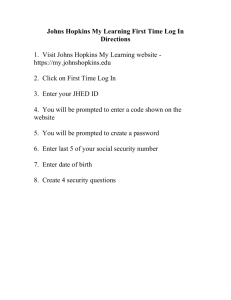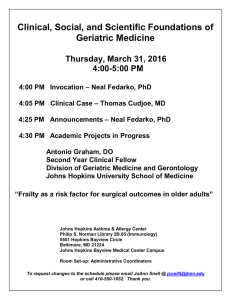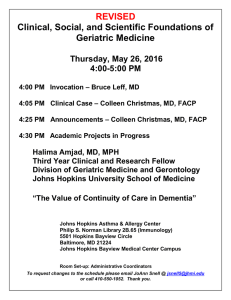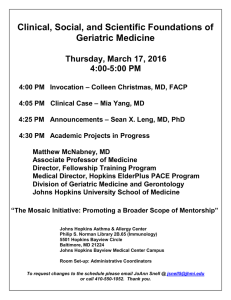The Scientist as a Responsible Member of Society:
advertisement
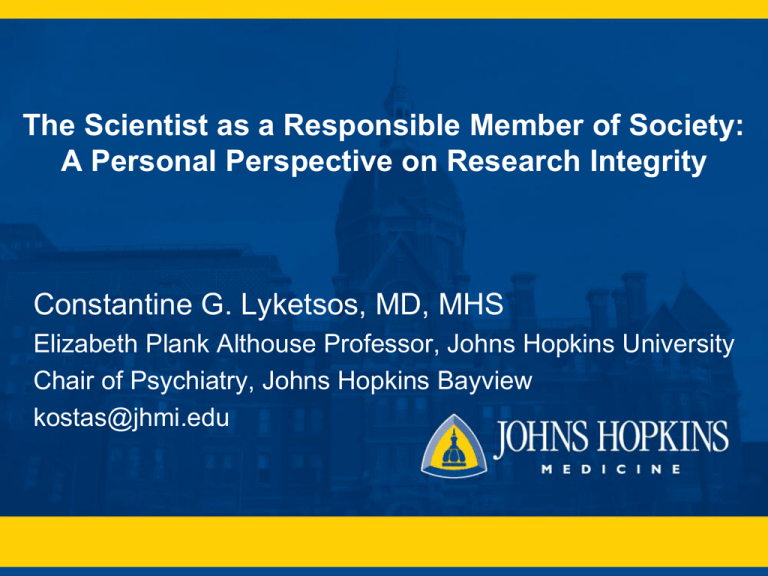
The Scientist as a Responsible Member of Society: A Personal Perspective on Research Integrity Constantine G. Lyketsos, MD, MHS Elizabeth Plank Althouse Professor, Johns Hopkins University Chair of Psychiatry, Johns Hopkins Bayview kostas@jhmi.edu Presentation overview • • • • Definitions-why are we here? Why am I giving this talk? More on integrity A few personal vignettes WHILE MY FOCUS IS ON HUMAN RESEARCH, THE KEY MESSAGES APPLY TO ALL MEDICAL RESEARCH Purpose of medical research • Prevent, cure, or treat disease and related human conditions • Make the lives of our patients better Johns Hopkins is a special place For me, research on humans necessitates a commitment to help participants access the best possible care at the same time I am also their doctor Definitions: human subjects research (CFR Title 45; Part 46) (f) Human subject means a living individual about whom an investigator (whether professional or student) conducting research obtains: (1) data through intervention or interaction with the individual, or (2) identifiable private information. http://ori.hhs.gov/education/products/mass_cphs/training_staff/RCReng/RCRCo mmonRule.htm#46.102#46.102 Research misconduct Johns Hopkins Definition … means fabrication, falsification, or plagiarism in proposing, performing, or reviewing research, or in reporting research results. a) Fabrication is making up data or results and recording or reporting them. b) Falsification is manipulating research materials, equipment, or processes, or changing or omitting data or results such that the research is not accurately represented in research records or reports. c) Plagiarism is the appropriation of another person's ideas, processes, results, or words without giving appropriate credit. d) Research misconduct does not include honest error or honest differences of opinion. e) Research misconduct includes the destruction of, absence of, or accused person's failure to provide research records accurately documenting the questioned research. Forms of misconduct • • • • • • • Falsification Obfuscation Fabrication Supression Plagiarism Self-plagiarism Ghost writing http://en.wikipedia.org/wiki/Scientific_misconduct • • • • Bare assertions Improper authorship Misappropriation Bibliometric inflation • Violation of ethical standards regarding human and animal experiments Why research misconduct? • • • • • Career advancement Money Competitiveness Laziness Ability to get away with it Why me? • • • • Investigator Research mentor Former IRB member and chair Research misconduct investigator •Son of George C. Lyketsos George C. Lyketsos, MD, FRCPsych 11 January 1917- 20 August 2011 • Professor of Psychiatry, National Kapodistrian Univeristy of Athens, 1974-1989 • Medical Director, Dromokaition Mental Hospital, 1947-1985 • Lived through the transition to modern psychiatry Human subject researcher in an era before regulation Dromokaition Mental Hospital • Bequest of major philanthropist 1887 • Where thousands of patients lived, some for decades • Where new therapies for mental illness where introduced in Greece • Where community placement of most patients took place by the 1980s • This was largely unregulated research The introduction of ECT to Greece: from The Story of My Life (GCL, 1998) The first patient finds himself And then the time came for the great trial…of ECT in a patient. Thinking of those days I am surprised by my confidence. I had no doubt things would go well. I chose for the trial patient X who had been lost to the world…nobody had shown any interest in him for many years…That morning in March 1946…(the staff) brought X. He was catatonic…We laid him down on a sofa and placed the electrodes on his temples which we had already rubbed with salted water… I pressed the button for 10ths of seconds. A jerk followed… I increased the intensity…I pressed the button for a longer duration and after a few seconds the seizure happened. We became scared as the patient turned blue. We fell onto him to provide artificial respiration. Quickly, breathing returned and we took him to the ward where he fell asleep. Later we visited him. He had awakened and was active… I asked him “How are you?” and he ANSWERED “fine.” This gave us courage and we repeated the ECT after two days. After that we were able to communicate enough to find out who his relatives where who came to visit. He is the phenomenon and I think he still lives at Dromokaition. In total he had ten ECT. It did not cure him, but he was able to live at the level of social life of a developed psychiatric hospital. Tidbits of the ECT story • Built their own machines (“cost 10 gold sovereigns to build and sold for 11”) • Offered to most every patient • Consent was obtained when families available or patients could discuss (no documentation) About 30% of patients improved and left the hospital within the next year Outcomes of ECT therapy • Schizophrenia: N=75, 6-12 treatments – 12 (16%) full remission (mostly catatonic) – 17 (23%) partial remission – 46 (61%) no change—mostly “demented” • Affective disorder: N=25 – 18 (72%) full remission – 6 (24%) partial remission – 1 (1%) no change Lyketsos GC, Arkalides N. The therapeutic method via electric shock at Dromokaition Therapeuterium. Results of 100 cases. (Experience of over 4,000 treatments.) Kliniki 1 December 1946 Other examples of Dromokaition research • • • • • Observational studies EEG research Frontal leucotomies Ancient Greek Drama therapy Rehabilitation methods None of our contemporary processes followed • Research happened • Patients were helped • Advances occurred How is that possible? INTEGRITY Definitions: integrity 1. firm adherence to a code of especially moral or artistic valuesINCORRUPTIBILITY 2. an unimpaired condition: SOUNDNESS 3. the quality or state of being complete: COMPLETENESS http://www.merriam-webster.com/dictionary/integrity But what is integrity really? • An attitude • A state of mind • A commandment • • • • Must be cultivated and honed Occurs in a context A team sport: you are not alone Modeling critical to its development Measuring integrity • Choice of research we conduct – Why is the study important? – Would you put your mother in your study? • How we look after our participants – How would you consent your sister/brother? – How would you monitor your ill child? • How we report our findings Personal vignettes • DIADS/CATIE/CITAD-placebo/vulnerable • ADAPT-crisis in a prevention trial for AD • DBS for AD-pushing the envelope • Mrs. F-my patient in 3 studies • Mrs. H-from participant to patient 35.5 million people have dementia today The number of living cases doubles every 20 years 115.3 million people with dementia by 2050—NEW CASES 7/12/2016 Alzheimer’s Disease International World Alzheimer’s Report, September 21, 2009 22 NPS are universal in dementia Steinberg et al, Int J Ger Psychiatry 2008 Treating NPS is a high priority • High utilization of treatments based on findings in general psychiatry – Antipsychotics, antidepressants, etc • Little controlled research • Safety concerns • We undertook placebo controlled RCTs The issues • Vulnerable population • Placebo controls The CATIE-AD Study Sertraline for the Treatment of Depression in Alzheimer Disease Rosenberg, Paul B. M.D.; Drye, Lea T. Ph.D.; Martin, Barbara K. Ph.D.; Frangakis, Constantine Ph.D.; Mintzer, Jacobo E. M.D., M.B.A.; Weintraub, Daniel M.D.; Porsteinsson, Anton P. M.D.; Schneider, Lon S. M.D.; Rabins, Peter V. M.D., M.P.H.; Munro, Cynthia A. Ph.D.; Meinert, Curtis L. Ph.D.; Lyketsos, Constantine G. M.D., M.H.S.; For the DIADS-2 Research Group Author Information From the Division of Geriatric Psychiatry and Neuropsychiatry, Department of Psychiatry and Behavioral Sciences, Johns Hopkins University School of Medicine (PBR, PVR, CGL); Department of Health Policy and Management (PVR), Department of Mental Health (CGL), Center for Clinical Trials (BKM, CF, CLM), Johns Hopkins Bloomberg School of Public Health; Johns Hopkins Bayview Medical Center (PBR, CGL), Baltimore, MD; Department of Neurosciences (JEM), Medical University of South Carolina and Ralph P Johnson VA Medical Center, Charleston, SC; Division of Medical Psychology (CAM), Department of Psychiatry and Behavioral Sciences, Johns Hopkins University School of Medicine; Department of Neurosciences (JEM), Medical University of South Carolina; Section of Geriatric Psychiatry (DW), University of Pennsylvania and Mental Illness Research, Education and Clinical Center (MIRECC), Philadelphia Veterans Affairs Medical Center; AD-CARE Program (APP), Department of Psychiatry, University of Rochester School of Medicine and Dentistry; Departments of Psychiatry, Neurology, and Gerontology (LSS), University of Southern California Keck School of Medicine. Received April 16, 2009; revised June 25, 2009; accepted July 7, 2009. Send correspondence and reprint requests to Paul B. Rosenberg, M.D., Department of Psychiatry and Behavioral Sciences, Johns Hopkins Bayview Medical Center, 5300 Alpha Commons Drive #447, Baltimore, MD 21224. e-mail: prosenb9@jhmi.edu Alzheimer Disease Anti-inflammatory Prevention Trial (ADAPT) • Primary prevention RCT with two outcomes: – Incident Alzheimer Disease (AD) – Cognitive Decline • Treatments vs. placebo – Conventional NSAID (naproxen 225 BID) – Selective COX-2 inhibitor (celecoxib 200 BID) • Six sites: Baltimore, Boston, Phoenix, Rochester, Seattle, Tampa/Sarasota • N=2422 aged 70+ with history of AD-like dementia in 1o relative: 437 at JHU ADAPT in crisis • Dec 2004—adenomatous polyps prevention trials suggest increased risk of cardiovascular events with celecoxib (OR~2.5) • Two similar trials stopped Dec 17 • ADAPT DSMB met week before and recommended continuation • • • • WHAT TO DO IN ADAPT? Took the risk seriously especially in prevention trial Considered re-consent and continuation, esp naproxen arm Logistics got in the way: media effects on participants, concerns about IRB review process, FDA hold on celecoxib trials • ENROLLMENT AND TREATMENTS STOPPED • FOLLOWUP CONTINUED Did we make the right decision? • Stopped a trial mid-stream largely for pragmatic reasons • Interfered with an experiment that may have identified a preventive therapy • We may never know Patient to research participant Mrs. RF • Married, artist in her 80s; healthy • Closely connected with husband-agent • First seen as outpatient for depression • Did well on antidepressants • Developed AD dementia • Requested research participation • ADRC, GSI RCT, apathy Rx RCT Research participant to patient Mrs. EH • ADAPT participant—her mother had AD • During ADAPT followup diagnosed MCI • Asked to become my patient • Continues in ADAPT • Several complex clinical issues The issues • My own patient in my own research • Triage of what’s the right study • Communication, disclosure, oversight The next plunge Final words: threats to integrity Excessive focus on process • Uses up resources and energy • Gives the wrong signal that the process assures integrity Research Integrity • An attitude • A state of mind • A commandment • • • • Must be cultivated and honed Occurs in a context A team sport: you are not alone Modeling critical to its development Johns Hopkins is a special place For me, research on humans necessitates a commitment to help participants access the best possible care at the same time I am also their doctor In Memoriam George C. Lyketsos 1917-2011 pictures after age 90 “Pepper” with his family age 94, a month before he passed Panel Discussion • Joseph Carrese, M.D., M.P.H. • David Hellmann, M.D. • Cynthia Rand, Ph.D. • Sheila Garrity, J.D., M.P.H., M.B.A., – Moderator 7/12/2016 44
